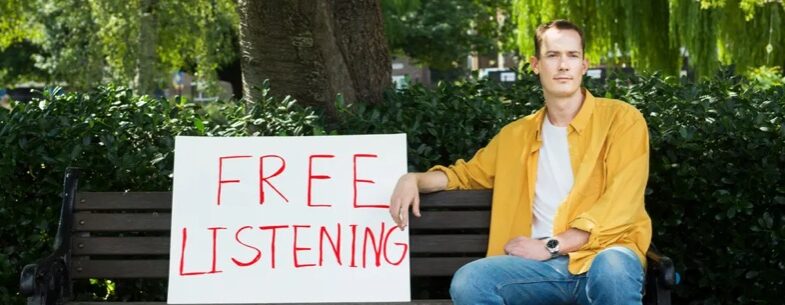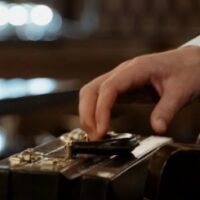It had been a long time since Lee had been happy. And she felt ungrateful for being unhappy, because she knew how lucky she was. She was successful at her chosen profession after decades of hard work. Her husband was a loving man who tended their house and child. Their child was a precocious boy that had all of his parents’ talent and, unfortunately, their unhappiness.
This, perhaps, bothered her most of all. A guilt had settled onto her unhappiness as she felt it had infected her family. Particularly her son, who could smile so sweetly that it broke her heart when he could see through her facade.
She should be grateful, and she knew it. She didn’t feel grateful, though, and that only dug her further into the hole of her disquiet. As an actress Lee had worked hard to be successful, and gotten lucky, an essential combination in such a competitive field, and now she was making enough money that Keb could stay at home to work on his painting and watch Robi. Now she felt like the lynchpin to their fragile existence.
It was on days that things were their worst that she rose before dawn, while Keb and Robi were soundly asleep, strapped on big sunglasses despite the dim light, and took the train to the day’s shoot. She could have called for a ride, but without the make-up or clothes that wardrobe would layer her in, she’d feel as ugly on the outside as she did on the inside. Like that, she’d crowd into a train with people who looked mostly as surly as she felt, in the hopes that it might make her realize how much better she had it. It never worked.
Waiting on the platform on a particularly bleak Wednesday, she heard someone call her name. There was a young man there, handsome in a sort of bland, sandy way, that somehow, without the make-up, without the lights and perfect camera angle, smiled with the recognition of a fan. She smiled back, feeling her soul retreat behind the walls of her cynicism. Would this one fawn over her, make demands, or become irate when Lee inevitably had to extricate herself from the exchange so she could get on with the business that had made her famous to begin with?
This young man, though, just smiled at her through bright brown eyes and said, “Love your stuff. You should be really proud of yourself. You’ve made a lot of people very happy.” Lee stood, mouth closed, not sure what to expect next, afraid such kind words be followed by some demand or request.
This one, though, continued to smile and let his words sink in as the train’s doors opened. With nothing else, he wished her, “Well, keep up the good work.” He stepped onto the train, the pneumatic doors closing behind him, leaving Lee on the platform with the knowledge that, for some people, she had made the world a brighter place.
When Lee arrived home, she hugged her husband, hard.
Keb was at the kitchen sink, washing up whatever pile of dishes had accumulated in the course of a day feeding their child. He let out an exhalation that became an exaggerated groan as he realized he was in the grip of his wife’s enthusiasm. He smiled over his shoulder at her, her face buried in his back. “Hi. How was your day?”
Lee loosened her grip enough to look up at her husband and share the grin with him she’d been wearing the entire ride home. “It was the best day I’ve had in a long time.”
“Really?” Keb tried to keep the surprise out of his voice, grabbing a towel. “You certainly worked late enough.”
Lee let go of her husband to begin unwinding her scarf, walking to their dining table. “I know, I’m sorry, but things just clicked today.”
Keb tamped down envy, putting his thumb on that gremlin as he dried his hands. “No trouble. I got Robi fed and he’ll be down to work on his homework in a bit. You can help if you’ve got the energy.”
“That sounds great.” Lee surprised Keb again with her answer. She usually came home drained.
Happy to see his wife happy, but curious, he asked, “Something different happen today?”
“Yah. It was the strangest thing. A fan come up to me at the station.”
Keb slowed the process of drying his hands, unsure of how to proceed into the potential minefield of his wife’s fame. “Oh? And how did that go?”
“He was lovely. He didn’t yell, ‘Hey! Are you famous?’ or hit on me or demand a selfie or autograph or just keep talking and not shut up. He just said I’d made a lot of people happy and I should be proud of myself.” As she struggled out of her coat, Lee’s back was to her husband, so she didn’t see the slow change to questioning on his face. “And then he just told me to keep up the good work. That’s it!”
Placing her coat down, Lee turned to her husband, about to expound on this last part, when she stopped, seeing that he was covered in splashes of primary colors. These were not the hues he usually worked in, nor was the untidiness. For an abstract painter, Keb was meticulous. But here he was, looking like he’d been involved in a finger-painting riot.
“What happened to you?”
Keb looked down on his smock, his curiosity about the stranger displaced by his own mess. “Oh, yeah. Me and Robi worked together in the studio today.”
“What?” A small jealousy stabbed at Lee. “You never let Robi in your studio.” Or me, she didn’t add.
Keb finished drying his hands, embarrassed by this truth. He guarded his time in his studio, never letting his wife or son in when he was trying to do serious work. He shrugged sheepishly, an action that Lee always found endearing from such a large man. “It’s strange, I had a similar experience today.”
“How do you mean?”
“We were playing at the park.” Keb paused, frowned. “Well, Robi was playing and I was watching him from a bench.” Keb left out, ‘Feeling sorry for myself,’ instead continuing with, “And this guy sat down next to me and bummed a smoke.” Lee clucked, unhappy at the habit, but Keb plowed on. “Then Robi hurt himself on the swing and I did the Dad thing.” Lee held her tongue, frustrated by Keb always minimizing how good he was at ‘The Dad Thing,’ but not wanting to turn this into another fight. Keb thought he kept the secret of his own unhappiness, but Lee knew. Thus, the cigarettes, the time alone in the studio, so many other little signs.
“Anyway, when I got back to the bench, the dude had this big grin on his face and told me what a great Dad I was. I don’t remember exactly what he said. Which is a bit weird, because I sat on the bench and thought about it a long time.” Keb’s expression took on the same wondering cast it always did when he ran into something strange in the city.
That was Keb, unable to take praise, but Lee asked. “What did you think about?”
“Oh – just that I’ve been silly, keeping Robi out of the studio. It’s not that I don’t need time to myself. It’s just most of the time these days I’m experimenting, so what does it matter if he’s there?” Keb smiled at his wife. “Robi is an agent of chaos anyway, so why not introduce that? Couldn’t hurt, right? It’s not like my art has has been selling.”
“Keb…”
“Oh, don’t ‘Keb’ me. I’m not feeling sorry, myself. It’s true. When we came home I brought Robi into the studio and we painted together for awhile. It was great fun.” He gestured to his paint-covered smock. “And he’s got a great eye for color.”
“That’s fantastic!”
“It is.”
“Then…why do you seem sad?”
“Oh, I’m not,” Keb shook his head. “It’s just…do you know how long it’s been since I’ve enjoyed painting?”
Lee laughed loud. “I do!” Thinking of how similar her own day had been, she added, “I guess we all need our own sandy, pale boy to show us what we’ve been missing.”
Lee’s chain of chuckles stopped with Keb’s question. “What did you say?”
“Oh, it’s just today on the set went really well…”
“No, I mean about a sandy, pale boy.”
“Oh! The stranger on the subway — “
Keb interrupted. “Was about this tall? Sandy hair, pale face? Bright green eyes?”
Lee side-eyed her husband, his hand held up at the height of her stranger. “I think he had brown eyes…?”
Husband and wife stared quizzically at one another, forming questions when they noticed Robi standing at the door of the kitchen. He was staring at them with his knowing eyes, the ones that made Lee always think of that ‘old soul’ phrase she disliked so much.
Bundled in his small arms were a ruler, glue, scissors, and batches of colored paper, all promises of a school project. Instead of greeting them, though, their son smiled. “I saw someone like that today. I know you say not to talk to strangers, but he was just nice and then left.”
Lee and Keb stared at each other. At the same time, they turned to their son and asked, “What did this person look like?”
——————————————————————————————————
Lee stared into the violet eyes of Aggie McPherson trying not to feel foolish. Not only was her story difficult to convince herself of, but the detective had stared at her throughout the telling with a kind of indifferent intelligence that made Lee uncomfortable.
“That’s all very interesting, Ms. Sinnoh. But I’m not sure how I can help.”
Lee continued to stare at Aggie, thinking about the pebbled glass on the door with its stenciled words, Aggie McPherson, Spectral Analyst, and wondered what she had come here expecting. “Well, I knew I couldn’t go to the police. What was I going to tell them, ‘Hello, my family is being stalked by a polite young man who says the nicest things?’ I don’t want to think about if the tabloids got ahold of that.”
Behind her desk, the diminutive detective smiled mischievously. “No, I suppose not. So let me ask, do you think you or your family are in danger?”
“Well…no.”
Aggie stood up and moved around her glass and steel desk, revealing small, well-shined shoes at the bottom of herwell-tailored suit. She sat in one of the chairs across from Lee, facing her without the barrier of the desk between them. Still she had the smile, but there was a kindness to it that hadn’t been there before. “Mrs. Sinnoh. May I call you Lee?”
“Of course.”
“What I can tell you is that Slakterquay has had stories of this young man, in one capacity or another, for quite some time. If you were to spend time combing the city, you’d eventually find a number of strangers with similar stories, meaningful positive messages delivered to individuals in a time of need by a young man matching a strikingly similar description.” Lee watched Aggie, realizing the detective may have conducted this search. This was only confirmed when she added, “I’ve even heard rumor he’s an angel.” Aggie’s smile fell away. “But you don’t believe in angels, do you?”
“No.”
“Neither do I.” Aggie slapped the arms of her chair and stood up, moving to stare out the window behind her desk, the city, bifurcated by its river, behind it. “So what would you like to know? You’re not in danger. You’re encounter with him has assisted you and your family. What else is there?”
Lee thought about that. Aggie let the silence stretch on, giving her client all the time she needed. Eventually, Lee said, “I suppose I want to know if he’s happy. Or at least OK.”
“You’re worried about him?”
“Well, yes. It doesn’t seem possible that he could have spoken to all of us in the same day. It almost feels like he would have had to be in multiple places at the same time.”
Aggie shrugged. “Perhaps he was. But I think you’ll have to accept this as one of Slakterquay’s more benevolent mysteries.” She walked back around her desk, extending a hand with well-polished nails.
Lee took her hand gently, standing as she did, unaccustomed to being the tallest person in the room. “It’s a pleasure to meet you Ms. McPherson.”
“It’s just Aggie. Given the discretion I’m sure you’d like, let’s just stick to first names, Lee.”
Lee smiled, happy at least one of her desires satisfied. “I suppose – have a nice day?”
“You as well.”
When Lee left, Aggie returned to her desk and picked up the sole framed picture on it. It was of a pale young man with brown hair and bright hazel eyes. She stared at it for a long time. “Come back to me, you idiot.”
See the author’s published work here.
Image Courtesy of Pal Hansen/The Observer
Related Posts
The Anniversary Ball Next Post:
The American, Trouble at the Gardens (pt. 2)
























Good one!
Glad you enjoyed it. It’s hard to underestimate the power of an encouraging word.